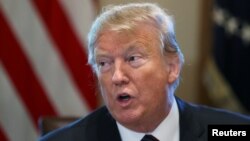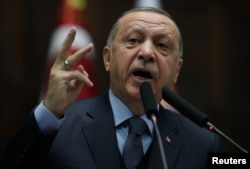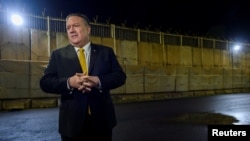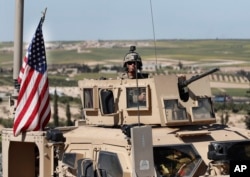President Donald Trump has stressed to Turkey's President Recep Tayyp Erdogan the importance of not mistreating the Kurds as U.S. forces begin to withdraw from Syria, the White House said.
In a phone call Monday, a White House statement said Trump "expressed the desire to work together to address Turkey's security concerns in northeast Syria while stressing the importance to the United States that Turkey does not mistreat the Kurds or other Syrian Democratic Forces with whom we have fought to defeat ISIS (Islamic State).”
Earlier, Trump warned Turkey that it would face economic devastation if it strikes at the Kurds when U.S. forces pull out of Syria and proposed the creation of a safe zone.
"Likewise, do not want the Kurds to provoke Turkey," Trump said in a tweet late Sunday. Without giving any further details, he wrote, "Create 20 mile (32 kilometers) safe zone."
A Turkish statement on the two leaders' phone call said they "discussed the idea of creating a security zone cleared of terrorism in the north of the country,"
The Kurdish-led Syrian Democratic Forces (YPG) were among the United States' closest allies in the fight against Islamic State militants inside Syria.
Turkey says the YPG is tied to the Kurdistan Workers Party (PKK) which has been fighting a long guerrilla war for more Kurdish autonomy inside Turkey.
Turkey considers the PKK a terrorist group and there are fears Turkey will attack Kurdish fighters inside Syria when the Americans leave.
Ibrahim Kalin, a spokesman for President Erdogan, responded Monday to Trump's tweet, comparing the YPG to Islamic State militants.
"Mr @realDonaldTrump Terrorists can't be your partners & allies," he wrote on Twitter. "Turkey expects the US to honor our strategic partnership and doesn't want it to be shadowed by terrorist propaganda. There is no difference between DAESH, PKK, PYD and YPG. We will continue to fight against them all."
Secretary of State Mike Pompeo said Saturday he is "optimistic" the Syrian Kurds will not be abandoned and confident the U.S. and Turkey can work out a deal to assure the Kurds will be safe.
The White House said Monday that Chairman of the Joint Chiefs of Staff General Joseph Dunford would meet with his Turkish counterpart on Tuesday to continue consultations on Syria.
The Kurds are looking for protection against a possible Turkish attack and Syria's Assistant Foreign Minister Ayman Sousan told reporters Sunday his government would like an intensified dialogue with the Kurds.
"Many of the Kurdish statements were positive regarding their concern for the unity of Syria," he said.
Kurdish officials have said they would like Russian mediation in any talks with the Syrian government.
Trump tweeted Sunday that what he calls the "long overdue" U.S. pull-out from Syria has started "while hitting the little remaining ISIS territorial caliphate hard and from many directions."
But a U.S. defense official has denied that it was withdrawing any troops from Syria, telling VOA the initial stages of the pull-out involve "equipment, not troops."
Trump unexpectedly announced last month that U.S. forces would be leaving Syria, causing confusion and concern among U.S. allies. The White House hinted that a pull-out could be complete within 30 days.
National Security Advisor John Bolton has since said there is no timeframe for a withdrawal.
Jeff Seldin contributed to this report.








